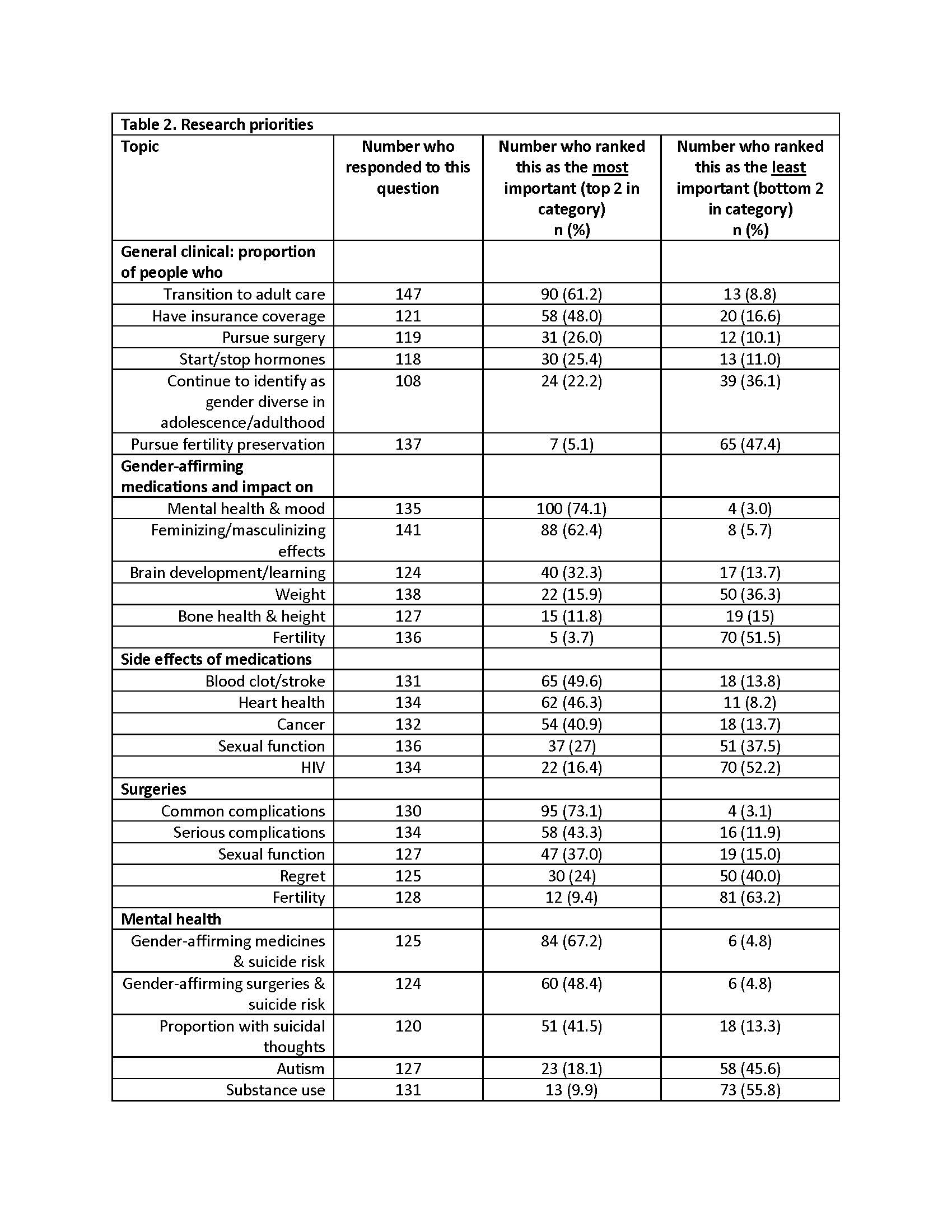Endocrinology: Transgender
Category: Abstract Submission
Endocrinology I
528 - Research priorities of gender diverse youth and their families
Friday, April 22, 2022
6:15 PM - 8:45 PM US MT
Poster Number: 528
Publication Number: 528.107
Publication Number: 528.107
Lindsey A. Warner, University of Colorado Anschutz Medical Campus, Department of Pediatrics, Denver, CO, United States; Claudia M. Douglas, Seattle Children's, Seattle, WA, United States; Sean J. Iwamoto, University of Colorado School of Medicine, Aurora, CO, United States; Daniel H. Reirden, University of Colorado School of Medicine, Aurora, CO, United States; Natalie J. Nokoff, University of Colorado School of Medicine, Aurora, CO, United States

Lindsey A. Warner, MD
Resident
University of Colorado Anschutz Medical Campus, Department of Pediatrics
Denver, Colorado, United States
Presenting Author(s)
Background: There is a growing awareness surrounding gender diversity and more research initiatives in gender-affirming health. Gender-affirming healthcare refers to interdisciplinary care which includes puberty blockade, hormone therapy, surgery, and behavioral health support. Research priorities are often determined by clinicians, researchers, with a paucity of data about the gender diverse community’s priorities for future research.
Objective: To determine the research priorities of patients and families at a gender-affirming clinic at a tertiary, pediatric medical center.
Design/Methods: IRB-approved electronic surveys were sent to 1,453 active patients/families at the TRUE Center for Gender Diversity at Children’s Hospital Colorado. Participants were asked to rank research topics from most to least important in six domains: clinic-specific outcomes, gender-affirming medications, gender-affirming surgeries, mental health, school, and family, with 4-7 choices in each category, including a free text option to fill out their own research priority.
Results: 210 individuals responded to the survey (14% response rate). Demographics are in Table 1; the majority were patients (54%), 38% were parents/guardians, and 8% filled it out together. More than half were white (56%). Survey responses are in Table 2; the highest-ranked responses are included here. Clinic-specific outcomes: “how best to transition to adult care” (61%); “insurance coverage for gender-affirming medicines/surgeries” (48%). Outcomes of gender-affirming medicines: impact on mental health (74%); overall feminizing/masculinizing effects (62%). Adverse medication effects: research on blood clots/stroke (50%) and heart health (46%). Gender-affirming surgeries: research on common (73%) and serious complications (43%). Mental health: “do gender-affirming medicines/surgeries decrease suicidality?” (67% for medicines, 48% for surgeries). School: “what percentage of gender diverse children/adolescents experience discrimination, harassment or bullying?” (40%). Families: “does feeling supported by family decrease suicidality in gender diverse children/adolescents?” (43%). Questions about fertility preservation were most often ranked as the least important.Conclusion(s): Patients and families at a single, large tertiary care gender program ranked research around mental health and mood as highly important, as well as possible adverse effects of gender-affirming medical therapies and complications of surgeries. Researchers should be aware of the priorities of the community.
Table 1.jpg) *Note the following demographic variables were select all that apply. Several variables had missing data, including age of patient, percentages are out of the total n.
*Note the following demographic variables were select all that apply. Several variables had missing data, including age of patient, percentages are out of the total n.
Table 2 page 1
Objective: To determine the research priorities of patients and families at a gender-affirming clinic at a tertiary, pediatric medical center.
Design/Methods: IRB-approved electronic surveys were sent to 1,453 active patients/families at the TRUE Center for Gender Diversity at Children’s Hospital Colorado. Participants were asked to rank research topics from most to least important in six domains: clinic-specific outcomes, gender-affirming medications, gender-affirming surgeries, mental health, school, and family, with 4-7 choices in each category, including a free text option to fill out their own research priority.
Results: 210 individuals responded to the survey (14% response rate). Demographics are in Table 1; the majority were patients (54%), 38% were parents/guardians, and 8% filled it out together. More than half were white (56%). Survey responses are in Table 2; the highest-ranked responses are included here. Clinic-specific outcomes: “how best to transition to adult care” (61%); “insurance coverage for gender-affirming medicines/surgeries” (48%). Outcomes of gender-affirming medicines: impact on mental health (74%); overall feminizing/masculinizing effects (62%). Adverse medication effects: research on blood clots/stroke (50%) and heart health (46%). Gender-affirming surgeries: research on common (73%) and serious complications (43%). Mental health: “do gender-affirming medicines/surgeries decrease suicidality?” (67% for medicines, 48% for surgeries). School: “what percentage of gender diverse children/adolescents experience discrimination, harassment or bullying?” (40%). Families: “does feeling supported by family decrease suicidality in gender diverse children/adolescents?” (43%). Questions about fertility preservation were most often ranked as the least important.Conclusion(s): Patients and families at a single, large tertiary care gender program ranked research around mental health and mood as highly important, as well as possible adverse effects of gender-affirming medical therapies and complications of surgeries. Researchers should be aware of the priorities of the community.
Table 1
.jpg) *Note the following demographic variables were select all that apply. Several variables had missing data, including age of patient, percentages are out of the total n.
*Note the following demographic variables were select all that apply. Several variables had missing data, including age of patient, percentages are out of the total n.Table 2 page 1

